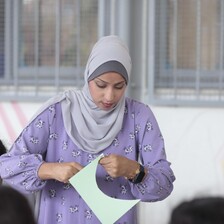The Electronic Intifada 16 November 2023

Injured Palestinians are brought to a hospital following an Israeli airstrike in Deir al-Balah in the central Gaza Strip, 14 November 2023.
APA imagesAfter Israel’s 2014 war on Gaza, I’ve always said that I never wanted to leave my house during any war.
Displacement is a difficult and frightening experience. It might be better to stay home and come to terms with death.
Since the beginning of this war, we have reassured one another that we would stay by each other’s side and that we would never leave the house. Our area in southern Gaza has been bombed several times, but we have persevered and been patient.
Still, the nights are excruciating.
The sounds of bombing have become louder. Missiles from Israeli planes and shells from tanks fire at random.
But I have endured through the fear, and we have stayed at home.
We live by the European Gaza Hospital, near the city of Khan Younis. My brother and father say it is crowded there, full of people displaced from the north.
Thousands of people from the north have arrived in the south after the Israeli army ordered them to evacuate.
I’ve wondered about the situation at the hospital and the conditions in which people were living. Every time we hear heavy bombing in our vicinity, my mother suggests that we go to the hospital, where perhaps we will be safer.
Not once has our family agreed to this. We all felt it would be too difficult, especially for her, as she has difficulty walking and needs a bed at night.
The bombing starts early
In the middle of last week, late in the evening, we heard our neighbors speaking loudly. They told us that they thought it would be a difficult and dangerous night for the area, since the bombing had started early.
They planned on going to the hospital to stay safe.
My mother was the first to support the idea. She knew that her walking troubles might put her in a difficult situation late at night if she was forced to leave the house.
I agreed to go to the hospital with my mother. My sister did not agree to go, and she cried, as she did not want to leave the house.
I put my things in a small bag and got dressed. The sounds of explosions were getting louder.
My mother and I left the house and walked down the street. I kept looking back at the house, hoping my sister would change her mind and come with us.
My cousin picked us up and we drove to the hospital gates.
Huge crowds of displaced people, in the thousands, had gathered outside. Inside the hospital it was the same situation, with people everywhere and tents made of blankets and sheets in the corridors.
It was an awful scene.
We stood there in shock. What are we living through?
My mother cannot stand for long periods of time, and a man rushed over to her with a chair for her to sit on.
I saw a friend’s family and we talked about what we’ve been living through and how we would get through the night. Then, an Israeli bombardment of missiles.
My mother wept, thinking of my sister and whether she would join us here.
Children came and sat next to me, eager to talk. One girl, a 10-year-old named Reema Abu Daqqa, told me that she was unhappy in the hospital and that she could not sleep here.
She said she hoped the war would end.
Explosions and extreme cold
My sister finally arrived, and though we were relieved, we all were hurting at having left the house. It was even more painful because this wasn’t our first war, the first time we’d been displaced.
The wars feel endless.
In the overcrowded hospital, children screamed and cried. They were tired and needed to sleep. Some slept sitting up, and others ran around playing.
All the women were overwhelmed by fatigue.
We finally settled down in a parking area. Through the night, we talked to each other, hoping for the time to pass quickly and for morning to arrive.
The night was very cold, and we had no roof over our heads. We were shivering from the cold, and I grew more concerned about my mother.
I tried to cover her with blankets to warm her.
I looked at the sky and heard the sounds of several successive explosions. I prayed for this night to end.
At 4 AM, I heard the call to prayer. I walked around the parking area.
Everyone was trying to sleep due to the extreme cold.
My mother was awake. She had barely slept at all, neither had my aunt.
We decided to try and return home, despite the sounds of warplanes and reconnaissance drones. We returned on foot, praying that we would arrive safely.
Along the route, scenes of suffering: so many people in need of food and water and security. So many waiting for this war to be over, waiting to return to their homes.
Every minute brings more destruction and killing.
At home, we are still recovering from illnesses brought on by sleeping in the severe cold. Yet so many are without homes.
The hospital, as it receives more displaced people than injured ones, is bearing the massive burdens of this war, providing shelter for the displaced. It is the only place we can go for safety, and even this safety is not guaranteed as Israel targets hospitals across Gaza.
Ruwaida Amer is a journalist based in Gaza.





